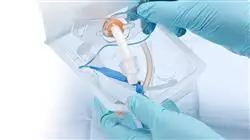University certificate
The world's largest faculty of nursing”
Introduction to the Program
With this Postgraduate diploma based on Relearning, you will stay at the technological forefront in Advanced Life Support and optimize the care of your patients"

A report published by the World Health Organization highlights the importance of Advanced Life Support in providing medical assistance to victims of traffic accidents. In this sense, nurses play an important role in providing immediate attention to critical injuries, contributing to the stabilization of patients during their transfer to hospitals. Aware of this, more and more healthcare institutions are calling for the incorporation of experts in the most innovative technologies in this field of specialization. To take advantage of this opportunity, nurses need to update their knowledge and incorporate the most cutting-edge tools into their practice to ensure rapid intervention that benefits patients.
To respond to this need, TECH implements a Postgraduate diploma in Technological Advances in Advanced Life Support for Nursing. Through 3 complete and updated modules, professionals will enrich their praxis by establishing the latest protocols for action in cases of Hypoxemia, Ionic Alteration and even Thrombotic Episodes. The syllabus will also include the management of postoperative vascular patients, including emergency resternotomy. Likewise, the didactic materials will provide graduates with the keys to properly use innovative technologies such as biomarkers, electroencephalograms and imaging tests.
On the other hand, the methodology of this program reinforces its innovative character. TECH offers a 100% online educational environment, which allows students to combine their studies with the rest of their regular commitments. It also employs the Relearningmethodology, based on the repetition of key concepts to fix knowledge and facilitate learning. The only requirement is that professionals have a device with Internet access, including their own cell phone. In this way, they will be able to enter the Virtual Campus to enjoy an educational experience that will take their work horizons to a higher level.
You will study from the comfort of your home and elevate your knowledge online with TECH, the world's largest digital university"
This Postgraduate diploma in Technological Advances in Advanced Life Support for Nursing contains the most complete and up-to-date scientific program on the market. The most important features include:
- The development of case studies presented by experts in Advanced Life Support and Critical Patient Monitoring for Nursing
- The graphic, schematic, and practical contents with which they are created, provide scientific and practical information on the disciplines that are essential for professional practice
- Practical exercises where self-assessment can be used to improve learning
- Its special emphasis on innovative methodologies
- Theoretical lessons, questions to the expert, debate forums on controversial topics, and individual reflection assignments
- Content that is accessible from any fixed or portable device with an Internet connection
You will control Telecare to provide remote medical care during emergency situations, especially in cases of cardiac arrest"
The program’s teaching staff includes professionals from the field who contribute their work experience to this educational program, as well as renowned specialists from leading societies and prestigious universities.
The multimedia content, developed with the latest educational technology, will provide the professional with situated and contextual learning, i.e., a simulated environment that will provide immersive education programmed to learn in real situations.
This program is designed around Problem-Based Learning, whereby the professional must try to solve the different professional practice situations that arise during the academic year For this purpose, the students will be assisted by an innovative interactive video system created by renowned and experienced experts.
Are you looking to specialize in Advanced Life Support Management in Neonates? Get it in only 400 hours thanks to this Postgraduate diploma"

Updating your knowledge about Foreign Body Airway Obstruction will be much easier thanks to the multimedia material provided by TECH"
Why study at TECH?
TECH is the world’s largest online university. With an impressive catalog of more than 14,000 university programs available in 11 languages, it is positioned as a leader in employability, with a 99% job placement rate. In addition, it relies on an enormous faculty of more than 6,000 professors of the highest international renown.

Study at the world's largest online university and guarantee your professional success. The future starts at TECH”
The world’s best online university according to FORBES
The prestigious Forbes magazine, specialized in business and finance, has highlighted TECH as “the world's best online university” This is what they have recently stated in an article in their digital edition in which they echo the success story of this institution, “thanks to the academic offer it provides, the selection of its teaching staff, and an innovative learning method aimed at educating the professionals of the future”
A revolutionary study method, a cutting-edge faculty and a practical focus: the key to TECH's success.
The most complete study plans on the university scene
TECH offers the most complete study plans on the university scene, with syllabuses that cover fundamental concepts and, at the same time, the main scientific advances in their specific scientific areas. In addition, these programs are continuously being updated to guarantee students the academic vanguard and the most in-demand professional skills. In this way, the university's qualifications provide its graduates with a significant advantage to propel their careers to success.
TECH offers the most comprehensive and intensive study plans on the current university scene.
A world-class teaching staff
TECH's teaching staff is made up of more than 6,000 professors with the highest international recognition. Professors, researchers and top executives of multinational companies, including Isaiah Covington, performance coach of the Boston Celtics; Magda Romanska, principal investigator at Harvard MetaLAB; Ignacio Wistumba, chairman of the department of translational molecular pathology at MD Anderson Cancer Center; and D.W. Pine, creative director of TIME magazine, among others.
Internationally renowned experts, specialized in different branches of Health, Technology, Communication and Business, form part of the TECH faculty.
A unique learning method
TECH is the first university to use Relearning in all its programs. It is the best online learning methodology, accredited with international teaching quality certifications, provided by prestigious educational agencies. In addition, this disruptive educational model is complemented with the “Case Method”, thereby setting up a unique online teaching strategy. Innovative teaching resources are also implemented, including detailed videos, infographics and interactive summaries.
TECH combines Relearning and the Case Method in all its university programs to guarantee excellent theoretical and practical learning, studying whenever and wherever you want.
The world's largest online university
TECH is the world’s largest online university. We are the largest educational institution, with the best and widest online educational catalog, one hundred percent online and covering the vast majority of areas of knowledge. We offer a large selection of our own degrees and accredited online undergraduate and postgraduate degrees. In total, more than 14,000 university degrees, in eleven different languages, make us the largest educational largest in the world.
TECH has the world's most extensive catalog of academic and official programs, available in more than 11 languages.
Google Premier Partner
The American technology giant has awarded TECH the Google Google Premier Partner badge. This award, which is only available to 3% of the world's companies, highlights the efficient, flexible and tailored experience that this university provides to students. The recognition as a Google Premier Partner not only accredits the maximum rigor, performance and investment in TECH's digital infrastructures, but also places this university as one of the world's leading technology companies.
Google has positioned TECH in the top 3% of the world's most important technology companies by awarding it its Google Premier Partner badge.
The official online university of the NBA
TECH is the official online university of the NBA. Thanks to our agreement with the biggest league in basketball, we offer our students exclusive university programs, as well as a wide variety of educational resources focused on the business of the league and other areas of the sports industry. Each program is made up of a uniquely designed syllabus and features exceptional guest hosts: professionals with a distinguished sports background who will offer their expertise on the most relevant topics.
TECH has been selected by the NBA, the world's top basketball league, as its official online university.
The top-rated university by its students
Students have positioned TECH as the world's top-rated university on the main review websites, with a highest rating of 4.9 out of 5, obtained from more than 1,000 reviews. These results consolidate TECH as the benchmark university institution at an international level, reflecting the excellence and positive impact of its educational model.” reflecting the excellence and positive impact of its educational model.”
TECH is the world’s top-rated university by its students.
Leaders in employability
TECH has managed to become the leading university in employability. 99% of its students obtain jobs in the academic field they have studied, within one year of completing any of the university's programs. A similar number achieve immediate career enhancement. All this thanks to a study methodology that bases its effectiveness on the acquisition of practical skills, which are absolutely necessary for professional development.
99% of TECH graduates find a job within a year of completing their studies.
Postgraduate Diploma in Technological Advances in Advanced Life Support for Nurses
At TECH Global University, we invite you to explore new frontiers in the care of critically ill patients with our postgraduate program in Advanced Life Support Technology Advances. This innovative program is designed for nursing professionals seeking to acquire the skills and knowledge necessary to provide comprehensive and specialized care to critically ill patients, using the latest technologies available. Through a solid curriculum, you will be able to delve into the pathophysiological, diagnostic and therapeutic principles of critical patient management, with a focus on the latest technologies and their practical application; develop skills in hemodynamic, respiratory and neurological monitoring of the critically ill patient using the latest equipment, among other competencies that will boost your career to success.
The best postgraduate nursing degree to specialize in
This academic offer contains multiple benefits: online classes that allow you to study from the comfort of your home or workplace, innovative learning methodology that combines theory and practice for comprehensive training, use of clinical simulations and virtual reality, an elite teaching team, updated and easily accessible study material so you can delve deeper into the topics of greatest interest, multimedia resources and access to specialized databases, among other advantages. Upon completion of this postgraduate course, you will be able to perform various functions, from performing a comprehensive assessment of the critically ill patient, identifying their needs and risks, using the latest evaluation technologies, to managing the most common complications associated with the critically ill patient in an effective and safe manner, using the latest generation of equipment and techniques. Take the next step in your professional career and join TECH Global University to become an expert in critical patient care, at the forefront of technological advances. Enroll now and get ready to make a difference in the lives of your patients!







